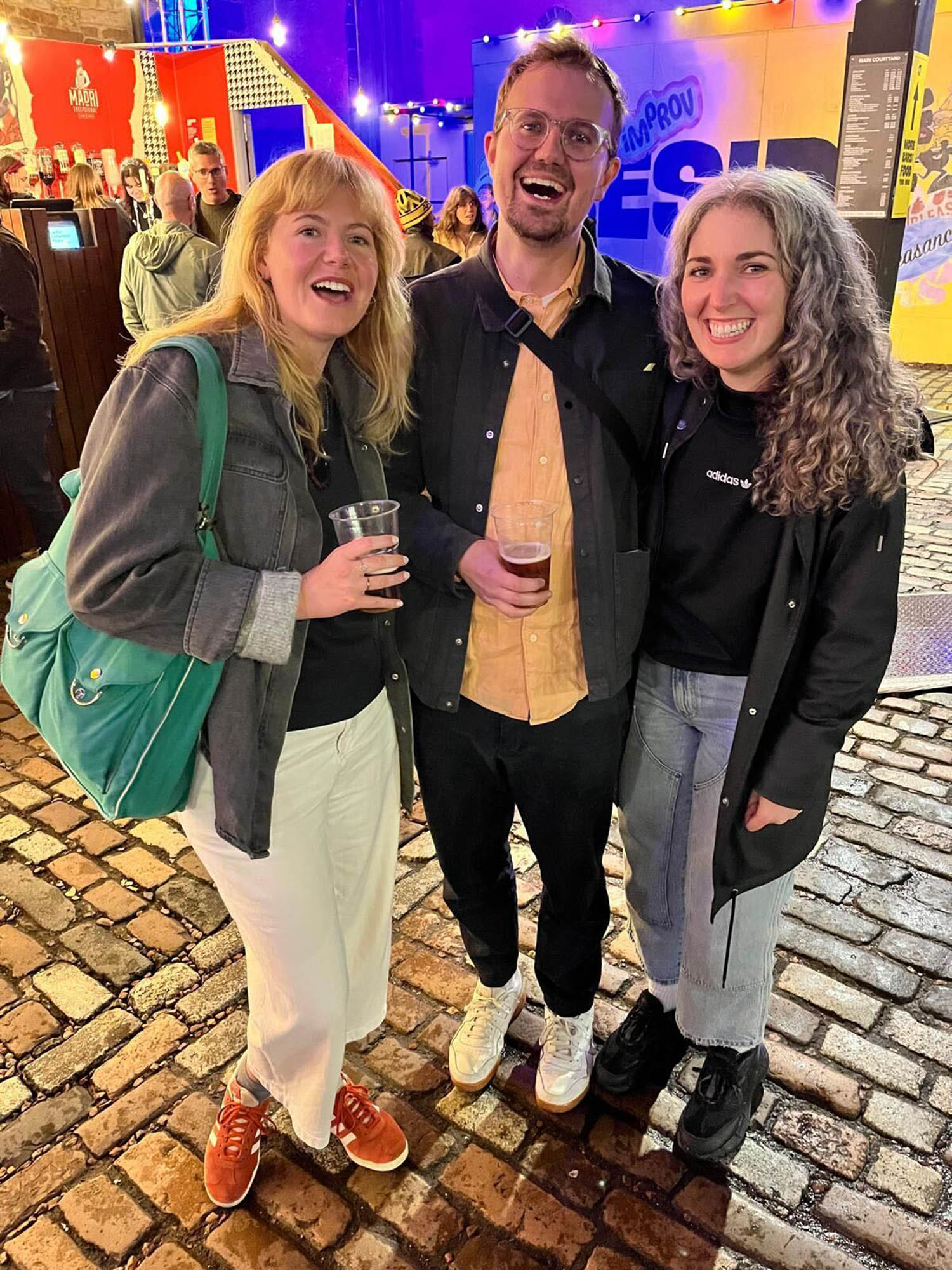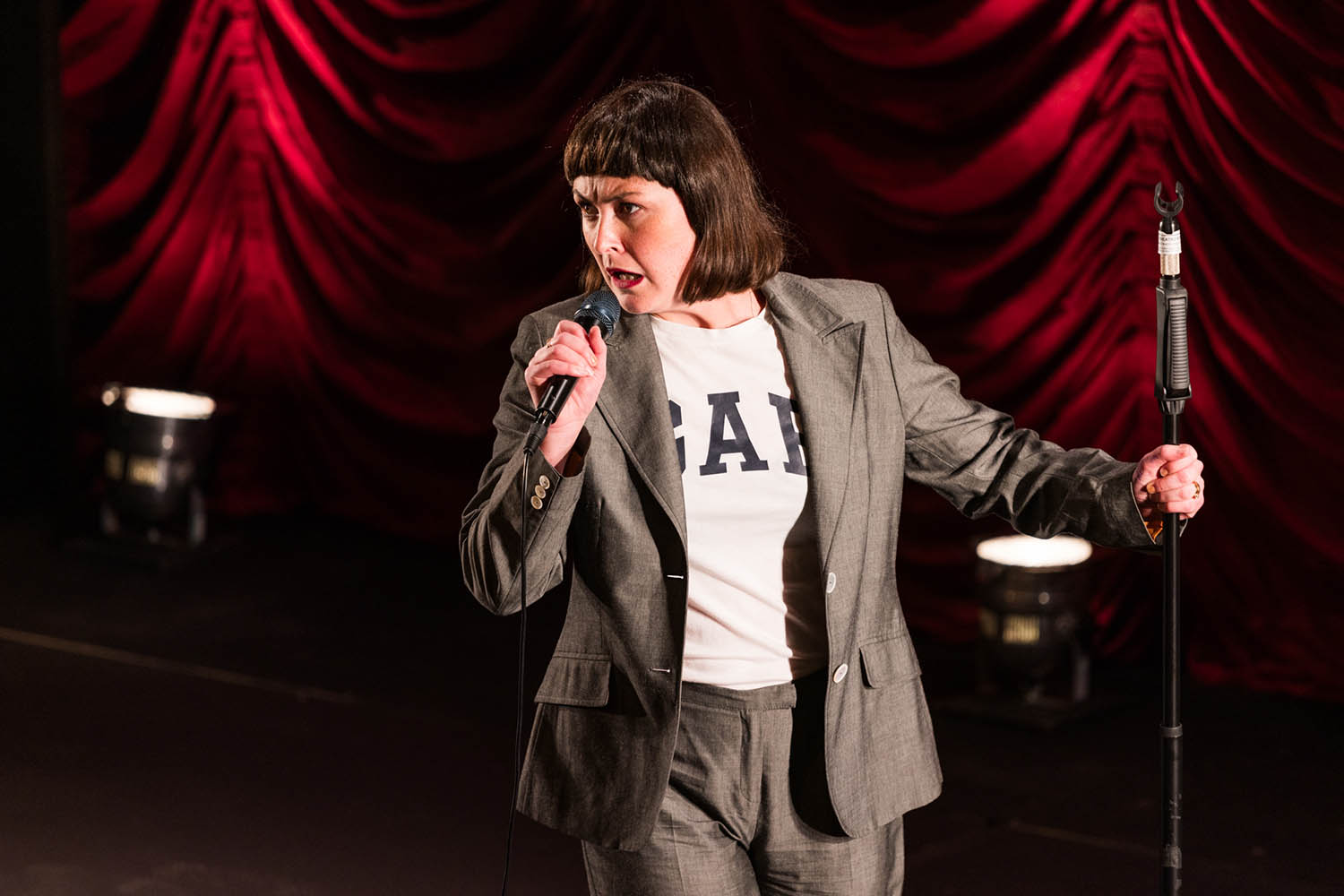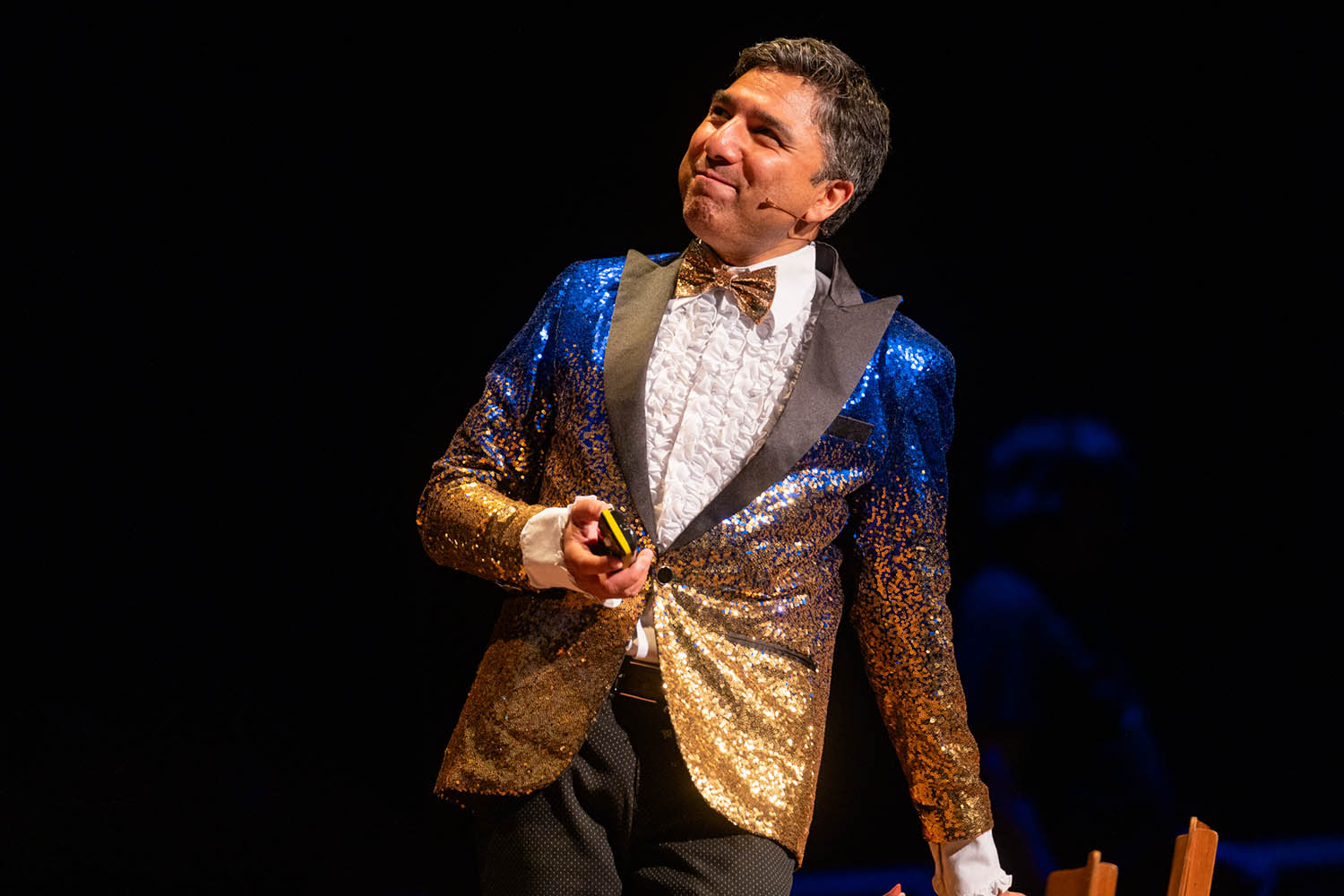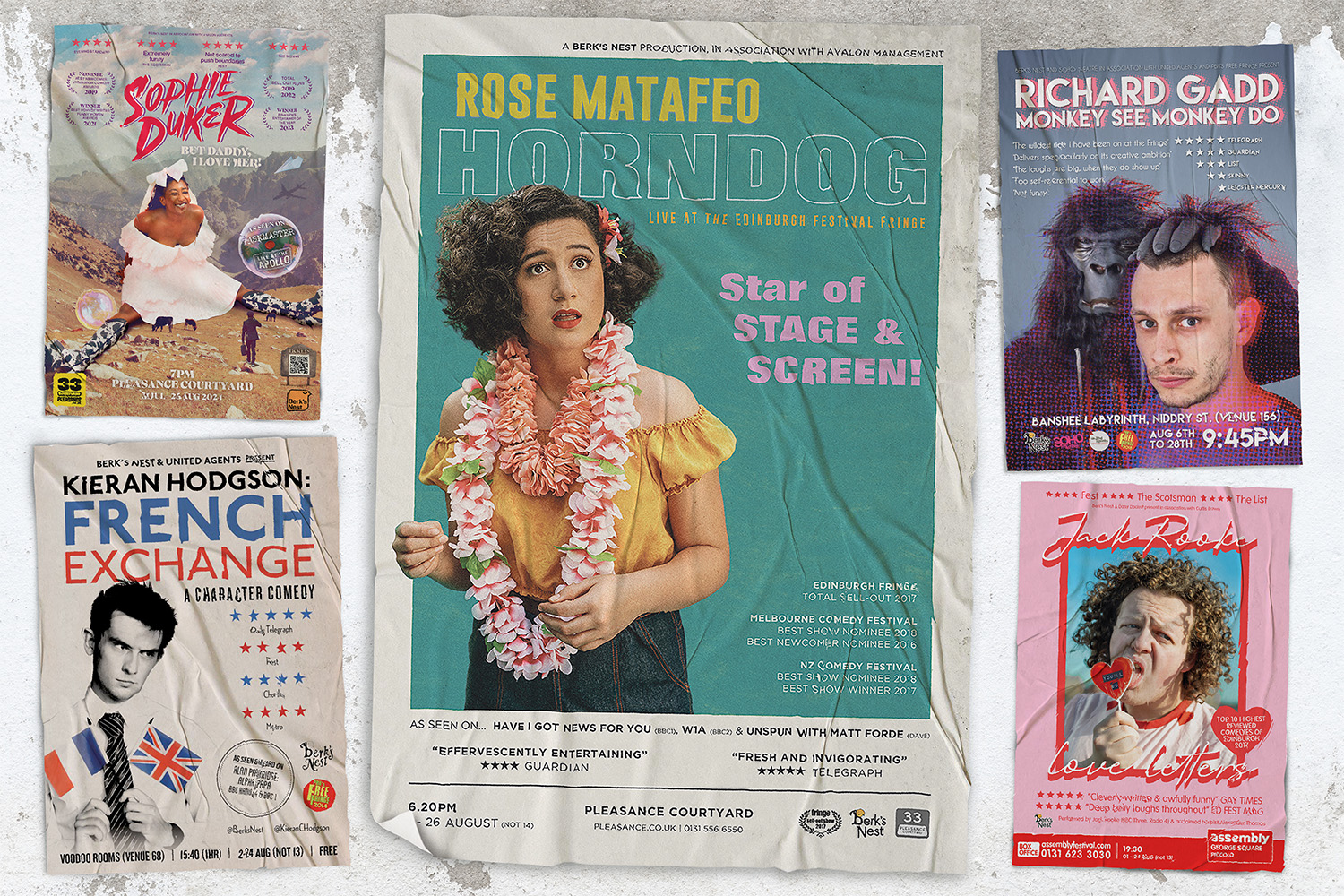In the cavernous new Soho theatre in Walthamstow, London, Owen Donovan is pacing the rows of empty seats. He knows this room; he grew up coming here when it was a cinema. Now, he’s bringing Kiell Smith-Bynoe, the star of BBC’s Ghosts, to the stage for a sold-out improv show. “It’ll be late-late,” he tells his partner over the phone. I’ve spent the last week chasing around the managing director of Berk’s Nest. I don’t know when he sleeps.
If you’re not a comedy insider, you probably haven’t heard of Berk’s Nest. But for a dozen years, the live show producers have been quietly slingshotting performers to stardom, with an effectiveness once reserved for the Cambridge Footlights. Their past playbills sport a litany of Netflix smashes and budding national treasures. Mae Martin. Lou Sanders. Rose Matafeo. Richard Gadd.
Unlike agents or managers, who nudge standups towards their most commercial angles, Berk’s Nest are more like comedy therapists. Their shows tend to emerge from vulnerable places: Matafeo’s Horndog saw her break down in tears about her obsessive romantic tendencies. Sirens star Cat Cohen’s 2019 show included songs about her #MeToo revenge fantasy and body shame. Gadd’s Monkey See, Monkey Do – which inspired Baby Reindeer – was about his experience with sexual assault. All of them were powerfully funny. And all of them collected silverware at the end of their Edinburgh fringe runs.
“A good show should make you think somewhat differently,” Donovan says. “Never at the expense of having a really good evening out.”
Berk’s Nest comedians may wield familiar weapons of snark or slapstick or astute observation, but they never hide behind them. This is humour that illuminates the darkness. Even in her hour-long portrayal of Downing Street’s Sue Gray, Emma Sidi’s own biographical truths leaked into the gaps in the civil servant’s backstory.

Founders Katie Churchill, left, and Phoebe Bourke run Berk’s Nest with Owen Donovan
“It’s outrageous to say you’re a comedian,” Sidi tells me backstage. “It’s like, illegal. It shouldn’t be a job.” It was Berk’s Nest, she says, that gave her permission to be one.
Berk’s Nest began in 2013 as a two-woman band of Phoebe Bourke and Katie Churchill. Straight out of university, they plucked a few shows to take up to Edinburgh, throwing themselves at every part of the operation. They’d give creative notes in a good-cop, bad-cop style; they’d design posters, hand out flyers, run tech. They booked venues and went to every photo shoot and agonised over titles. No one told them they couldn’t do it all, so they did.
“There weren’t jobs for us in the industry so we created our own,” Churchill says.
“We were one person,” Bourke suggests.
“We only had one email,” Churchill confirms.
Newsletters
Choose the newsletters you want to receive
View more
For information about how The Observer protects your data, read our Privacy Policy
Both Bourke and Churchill are the daughters of nurses. Maybe this is why both can instinctively see what needs to be done and do it. It’s almost certainly how they learned to be savvy with money. Edinburgh was – and remains – phenomenally expensive for new acts. The duo realised they could take advantage of the free fringe to secure cheap spaces, and use their small budgets to add production value: lights, sound, technicians. “We both had full-time jobs.” Bourke laughs at the absurdity of this. “Katie got me a job at an estate agent. I would take all my year’s holiday going to Edinburgh for the whole month.”
Their first performer was Kieran Hodgson, now star of the BBC sitcom Two Doors Down, with “an ironically dry show about the Gainsborough floods of 1947”.

‘It’s outrageous to say you’re a comedian’: Emma Sidi
“He was such a model student,” Bourke remembers. “If you’re not going to work your ass off, there’s no point doing it.” They printed his posters using the estate agent’s printer.
“I wouldn’t say Katie and I had a plan past, ‘Let’s just make shows that we’re really proud of’,” Bourke says. “It was do first, think later.”
The next year, they added Lou Sanders and Mae Martin to their roster.
By August 2015, they were juggling six shows, including Hodgson’s latest. Bourke had left the estate agent behind and found the perfect gig: assistant producer on a TV programme that filmed in Edinburgh between one and five in the morning. Ideal. The other AP on that ill-fated programme was Owen Donovan.
Donovan was producing Richard Gadd’s show Waiting for Gaddot at the Banshee Labyrinth. “We became very close, despairing with one another about how little sleep we were getting.”
But the hustle paid off. Gadd was tipped as the underground hit of the fringe and Hodgson was nominated for an Edinburgh Comedy award. Back in London, they joined forces. With Donovan aboard, they could double the number of shows.
The result was immediately effective. Gadd took home the best show award for Monkey See, Monkey Do in 2016. Hodgson was nominated again for Maestro. A brassy woman they picked up from the West Country was nominated for best newcomer: the inimitable Jayde Adams. And Berk’s also shipped over an unknown 24-year-old Kiwi named Rose Matafeo.
A good show should make you think differently – but never at the expense of having a really good evening out
A good show should make you think differently – but never at the expense of having a really good evening out
“I had no agent,” Matafeo remembers. “They saw what I did and they liked that. No one obviously knew who I was, but they believed in the show and they took a bit of a risk.”
The next three years were a whirlwind of shows that picked up awards, toured the country, crossed the Atlantic, sold to streamers. “They worked crazy hours, with a guerrilla-esque attitude,” says Matafeo. “How hard they were working in the early days was astounding and possibly unethical.”
Alongside their growing reputation as kings of the fringe, Berk’s was fostering a comedy community back home in London. A five-storey shared house in Finsbury Park, where Phoebe lived with comic Jack Barry and a group of other friends, became Berk’s headquarters. “It was our rehearsal space; it was our meeting space. One comedian was arriving as another was leaving,” remembers Bourke. “The fucking basement was full of Edinburgh props that I had shoved down there. We had legendary parties.”
“It felt like there were no parents,” Bourke says. And financially speaking, there weren’t. They may have all gone to university, but as Bourke insists: “None of us are poshos. We had to help each other.” Friends would design posters on the cheap and use them to create graphic design portfolios. One year, acclaimed character actor Lolly Adefope ran tech. They were defined by a scrappiness that demanded innovation.
Naturally, when the pandemic hit, they refused to be daunted. Donovan let go of all other work and threw himself at Berk’s. When lockdowns lifted, they had projects ready to go. Their reputation was carried by the success of the acts they had nurtured, who were finding new avenues for their work. Their weirdos were selling out the West End. They were touring internationally and writing shows for big streamers. They were debuting at Cannes.

There is a new emphasis on extended tours for comedians such as Nick Mohammed
Bourke and Churchill were also expanding their influence beyond the live stage. Churchill became a comedy executive at Two Brothers, the company behind Fleabag. Bourke has been writing and directing comedy for Netflix, Sky and Channel 4, and is developing a feature film of her own.
“[In TV], there are so many hurdles and people you have to convince to let the work out there,” Bourke sighs. “We just want to continue to be the place that does the experimental stuff. So much of the creative world is full of ‘noes’ rather than ‘yeses’. We want to continue to be the ‘yes’ people.”
Donovan is running Berk’s day-to-day now, continuing to exercise a restless ambition. There are more staff to pay. “I like to think that we still take as many risks,” he says. “But for every one or two of those, we need to have a show that is operating on a much bigger scale.”
At the Richmond theatre later that week, Emmy-nominated Ted Lasso star and Berk’s Nester Nick Mohammed pulls plastic bag after plastic bag out of a larger plastic bag as the Moonlight Sonata plays in the background. The crowd has put away several bottles of white wine, and even Mohammed is forced to note: “It’s getting rather rowdy!” His latest Show Pony tour is designed to play as well in Tunbridge Wells as Skegness. But, somehow, it still defies categorisation – part magic show, part sendup of racial expectations, part roller-derby, all delivered by a camp northern panto character. If this is Berk’s Nest’s safe bet, the trick is making us feel the show is in any way conventional.
Even with the new emphasis on extended tours like Mohammed’s, the Edinburgh fringe remains the focus of Berk’s Nest’s year. “It’s still the only place in the world where we can do work of every scale that we want to be working on,” Donovan says. Their seven-show slate this year is typically diverse, with a riotous cabaret from Jordan Gray about death threats she has received; a treatise on the US healthcare system from Cat Cohen; and an hour about Dagenham from club comic Liam Withnail. Everything in the lineup contains the Berk’s fingerprint: under the banner of comedy, a new kind of openness and vulnerability and a determination to get on stage to make it funny.
Photographs by Berk’s Nest, Paul Gilbey, Corinne Cumming, Haiminh Le, Sarah Harry-Issacs

